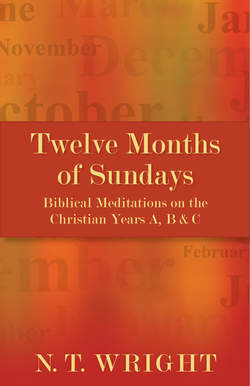Читать книгу Twelve Months of Sundays - N.T. Wright - Страница 36
На сайте Литреса книга снята с продажи.
ОглавлениеThe Second Sunday of Easter
Acts 2.14a, 22–32
1 Peter 1.3–9
John 20.19–31
Jesus’ resurrection scattered new meanings all around, like light reflecting a thousand ways off a priceless jewel. The first thing was the validation of Jesus’ messianic ministry. His powerful deeds had commended him to Israel, but not everyone had believed that God was at work in him. The resurrection unveiled the truth; and the way of getting a handle on it was to tell the scriptural story and to show that it had now reached its dramatic conclusion. The story of David, culled here from various psalms, pointed the way. Nobody could have supposed that the crucified Jesus was the Messiah (despite what some have suggested, there is no pre-Christian evidence that any Jews believed in such a thing); but the resurrection declared, before anything else, that Jesus really was, and is, the Messiah. His life really had been messianic, and God had validated it. Early Christianity was messianic to the core; the explanation was that God had raised Jesus from the dead.
The second meaning that quickly followed was that the Messiah’s followers now shared in God’s new world. We too easily read 1 Peter 1 in terms simply of a supernatural ‘salvation’, the heritage which is ‘kept safe in heaven for you’. But the image is not of us going to heaven to experience it, but of heaven as the celestial cupboard where God keeps the wonderful things that will one day be brought out for all to see. The resurrection has opened up the vista of a whole restored creation, under the saving lordship of the Messiah. This is the heritage that can never go mouldy. And those who belong to the Messiah discover that the new creation has already infected them; the new stirrings of faith, hope and above all joy within them are the signs of this new life, new birth, so that they are simultaneously out of tune with the way the world still is and joyfully in tune with the new world that will appear when Jesus is ‘revealed’. Peter, like Paul in some passages, thinks here of Jesus as present though invisible. The risen Lord will one day be seen again, as he was in the upper room, and those who now love him will find their true selves (their ‘souls’, v. 9, though the word to a Jew hardly carried the disembodied sense it has for us) rescued from the trials that beset them in the present.
John’s resurrection accounts are full of fresh meaning, but the key to this passage is the new commission that follows from the vision of faith. ‘As the Father sent me, so I send you’: the messianic life of Jesus is to be replicated through Jesus’ people, as, with the breath of new creation in their nostrils, they go out with the message of forgiveness, and warning too. Thomas’ cameo appearance sums up the paradox of faith from the whole gospel: touching is possible, seeing is enough, but believing is best of all.
